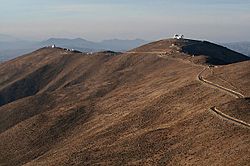Las Campanas Observatory facts for kids
Quick facts for kids Las Campanas Observatory |
|||||||||||
|---|---|---|---|---|---|---|---|---|---|---|---|

Telescopes at Las Campanas Observatory
|
|||||||||||
| Organization | Carnegie Institution for Science | ||||||||||
| Code | 304 | ||||||||||
| Location | Atacama Region, Chile | ||||||||||
|
Coordinates
|
29°00′53″S 70°41′33″W / 29.0146°S 70.6926°W
|
||||||||||
| Altitude | 2,380 metres (7,810 ft) | ||||||||||
| Established | 1971 | ||||||||||
|
|||||||||||
The Las Campanas Observatory is a special place in the Atacama Region desert of Chile where scientists study the stars and space. It's like a giant stargazing station! The Carnegie Institution for Science owns and runs this observatory. It was built in 1969. The main office is in La Serena, a city about 100 kilometers (62 miles) away. The observatory itself sits high up, about 2,400 meters (7,874 feet) above sea level, which helps it get a clear view of the sky.
On February 24, 1987, two astronomers, Ian Shelton and Oscar Duhalde, made an exciting discovery here. They were the first to see a huge star explosion called Supernova 1987A (SN 1987A).
Contents
Exploring the Universe with Telescopes
The Las Campanas Observatory is home to many powerful telescopes. These giant "eyes" help astronomers see far into space and learn about planets, stars, and galaxies.
Main Telescopes at Las Campanas
- Magellan Telescopes — These are two very large telescopes, each 6.5 meters (21 feet) wide. They are named after famous astronomers, Walter Baade and Landon Clay.
- Du Pont Telescope — This telescope is 2.5 meters (100 inches) wide. It's named after Irénée du Pont and has been working since 1977.
- Swope Telescope — This one-meter (39-inch) telescope is named after Henrietta Swope.
- Warsaw Telescope — This 1.3-meter (51-inch) telescope is owned by the Warsaw University Observatory.
- Giant Magellan Telescope — This is a super-sized telescope that is still being built! It will have seven huge mirrors, making it act like one giant 24.5-meter (80-foot) telescope. It will be incredibly powerful.
- NANTEN Telescope — This was a 4-meter (13-foot) radio telescope that used to be here. It has since been moved to another part of the Atacama desert.
Small Cameras for Big Explosions
The observatory also has small "Pi of the sky" wide-angle cameras. In 2008, these cameras filmed a gamma ray burst called GRB 080319B. This was the biggest explosion ever seen in the Universe, and it was so bright that you could have seen it without a telescope!
Images for kids
See also
 In Spanish: Observatorio Las Campanas para niños
In Spanish: Observatorio Las Campanas para niños
 | William Lucy |
 | Charles Hayes |
 | Cleveland Robinson |









